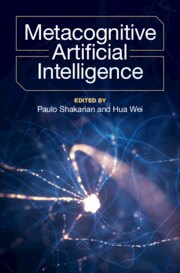Book contents
- Frontmatter
- Contents
- Contributors
- Acknowledgments
- Part I Introduction
- Part II Taxonomy of Metacognitive Approaches
- Part III Neuro-Symbolic Models in AI
- Part IV Metacognition with LLMS
- Part V Metacognition in Learning Agents
- 9 Uncertainty Quantification’s Role in Metacognition
- 10 The Role of Predictive Uncertainty and Diversity in Embodied AI and Robot Learning
- Part VI Assured Machine Learning in High-Stakes Domains
- Part VII Metacognition as a Solution to Handle Failure
- Part VIII Applications of Metacognitive AI
9 - Uncertainty Quantification’s Role in Metacognition
from Part V - Metacognition in Learning Agents
Published online by Cambridge University Press: 08 September 2025
- Frontmatter
- Contents
- Contributors
- Acknowledgments
- Part I Introduction
- Part II Taxonomy of Metacognitive Approaches
- Part III Neuro-Symbolic Models in AI
- Part IV Metacognition with LLMS
- Part V Metacognition in Learning Agents
- 9 Uncertainty Quantification’s Role in Metacognition
- 10 The Role of Predictive Uncertainty and Diversity in Embodied AI and Robot Learning
- Part VI Assured Machine Learning in High-Stakes Domains
- Part VII Metacognition as a Solution to Handle Failure
- Part VIII Applications of Metacognitive AI
Summary
AI systems have struggled to be deployed in safety-critical applications where the consequences of incorrect predictions are severe. In complex applications and environments, like autonomous driving, it is often impossible or impractical to curate a dataset or simulator that sufficiently spans the entire input space, making it improbable that a perfect agent can be trained offline. Metacognitive AI represents an approach to design agents that continue safely learning and adapting as they encounter new or uncertain scenarios in the environment, which improves their performance over time. A key component to achieve this behavior is quantifying the AI agent’s prediction uncertainty to enable the agent to understand when it is operating in a previously unseen scenario. In this chapter, we discuss a framework for creating a metacognitive agent and delve deeper into Meta Modeling, a method for augmenting existing neural networks with uncertainty quantification. Our approach provides a first step toward realizing a metacognitive AI agent.
Information
- Type
- Chapter
- Information
- Metacognitive Artificial Intelligence , pp. 135 - 147Publisher: Cambridge University PressPrint publication year: 2025
